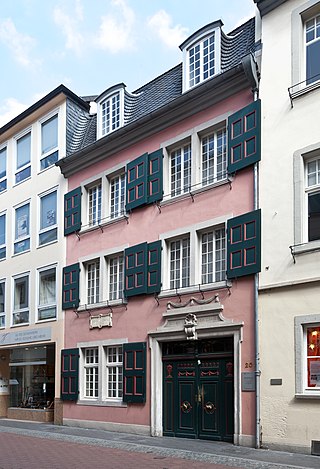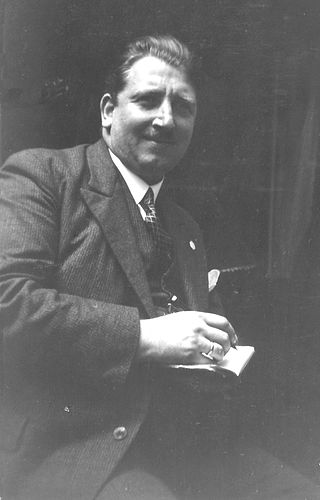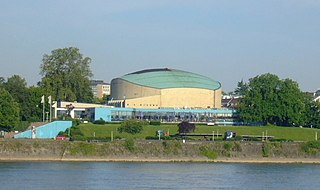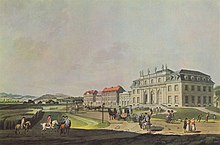
The federal city of Bonn (German pronunciation: [bɔn] is a city on the banks of the Rhine located in the German state of North Rhine-Westphalia, with a population of over 300,000. About 24 km south-southeast of Cologne, Bonn is in the southernmost part of the Rhine-Ruhr region, Germany's largest metropolitan area, with over 11 million inhabitants. It is a university city, the birthplace of Ludwig van Beethoven and the capital of West Germany from 1949 to 1990. Bonn was the seat of government of reunited Germany from 1990 to 1999.

Ludwig van Beethoven was a German composer and pianist. Beethoven remains one of the most admired composers in the history of Western music; his works rank amongst the most performed of the classical music repertoire and span the transition from the Classical period to the Romantic era in classical music. His career has conventionally been divided into early, middle, and late periods. His early period, during which he forged his craft, is typically considered to have lasted until 1802. From 1802 to around 1812, his middle period showed an individual development from the styles of Joseph Haydn and Wolfgang Amadeus Mozart, and is sometimes characterized as heroic. During this time, he began to grow increasingly deaf. In his late period, from 1812 to 1827, he extended his innovations in musical form and expression.

Bad Godesberg is a borough (Stadtbezirk) of Bonn, southern North Rhine-Westphalia, Germany. From 1949 to 1999, while Bonn was the capital of West Germany, most foreign embassies were in Bad Godesberg. Some buildings are still used as branch offices or consulates.

Count Ferdinand Ernst Joseph Gabriel von Waldstein und Wartenberg was a German nobleman and patron of the arts. A member of the Bohemian House of Waldstein and an early patron of Ludwig van Beethoven, his political and military roles included the office of a Geheimrat in Bonn, commander (Komtur) of the Teutonic Order, and (briefly) colonel of a light infantry regiment that he had raised.

Archduke Maximilian Francis of Austria was Elector of Cologne and Grand Master of the Teutonic Knights. He was the youngest child of Holy Roman Empress Maria Theresa and Holy Roman Emperor Francis I. He was the last fully functioning Elector of Cologne and the second employer and patron of the young Ludwig van Beethoven.

The Beethoven House in Bonn, Germany, is a memorial site, museum and cultural institution serving various purposes. Founded in 1889 by the Beethoven-Haus association, it studies the life and work of composer Ludwig van Beethoven.

Theater Bonn is the municipal theatre company of Bonn, North Rhine-Westphalia, Germany. It is an organization that produces operas, musicals, ballets, plays, and concerts. It operates several performance venues throughout the town: Bonn Opera for music theatre, the Kammerspiele Bad Godesberg and Halle Beuel for plays, and the Choreographisches Theater for ballet and dance.

Bonn-Mehlem station is a through station in the Bonn district of Lannesdorf in the German state of North Rhine-Westphalia. It has three platform tracks and is located on the Left Rhine line south of Bonn Hauptbahnhof. The station also is served by buses and has parking spaces. It is classified by Deutsche Bahn as a category 4 station.

Joseph Roth was a German teacher and politician from the Centre Party. He was chairman of Centre Party in Bad Godesberg, and a member of the Bonn County District Council.
The following is a timeline of the history of the city of Bonn, North Rhine-Westphalia, Germany.

The Äskulapstein is a Roman votive stone which was found in the sixteenth century at Godesburg. Today it is kept in the Rheinisches Landesmuseum Bonn.
Wilhelm Neumann-Torborg was a German sculptor whose works are still well-known.

The Beethoven Orchester Bonn is a German symphony orchestra based in Bonn, North Rhine-Westphalia. It dates back to 1907, when a professional orchestra was established. Named for Ludwig van Beethoven, who was born in Bonn, the orchestra's principal concert venue is the Beethovenhalle.
Beethoven Ring is an annual award by the association "Citizens for Beethoven" of the city of Bonn. Bürger für Beethoven is Bonn’s largest cultural association. Its purpose is to promote Beethoven’s music and preserve his memory in the city of his birth. In a vote, the 1500 members of the "Citizens for Beethoven" determine one out of the five youngest artists at the Beethovenfest Bonn, that have interpreted a work of Beethoven. The official award ceremony takes place within the framework of a concert in the Beethoven-Haus. Other Beethoven Rings were awarded by the Beethoven Society Vienna or the Wiener Musikakademie.

Wilhelmine Lübke was a German teacher and the wife of Heinrich Lübke. When he became President of the Federal Republic of Germany in 1959, she represented the country internationally. She founded the Kuratorium Deutsche Altershilfe and was president of the Müttergenesungswerk. The Wilhelmine-Lübke-Preis is named after her.
Ulrike Sonntag is a German operatic soprano and academic voice teacher at the Staatliche Hochschule für Musik und Darstellende Kunst Stuttgart. She was previously a member of the Staatstheater Stuttgart, Vienna State Opera, and other ensembles, and has performed in operas and concerts, and taught masterclasses, in several countries. Among her recordings are rarely performed oratorios by Fanny Hensel and Paul Hindemith.
Günther Massenkeil was a German musicologist, academic teacher, writer and concert singer (baritone). His main field of research was sacred music of the 16th to 20th century. He served as director of the musicology department at the University of Bonn from 1966 to 1991. He became known beyond academia for his editing and supplementing of the eight-volume encyclopaedia, Das Große Lexikon der Musik.
Gustav Classens was a German conductor who shaped musical life in Bonn. He was municipal music director and conductor of the Beethoven Orchester Bonn from 1933 to 1949, continuing concerts during World War II and reviving them after the war. He was then for decades conductor of the choir Chor der Bonner Bach-Gemeinschaft that he founded.

The Schauspielhaus Bad Godesberg is the largest theatre in the city of Bonn and the first new theatre building in the Federal Republic of Germany in the post-war period. The building was constructed in the Bad Godesberg city centre in the early 1950s. It now belongs to the Alt-Godesberg district of Bonn and is located at Theaterplatz 9 / Am Michaelshof 9 ; it is under Denkmalschutz.

Klassische Philharmonie Bonn is a German touring symphony orchestra, based in Bonn, North Rhine-Westphalia. It was founded by Heribert Beissel in 1986, derived from the Chur Cölnisches Orchester that he had founded in 1959 to perform music played originally at the Bonn court of the Electors of Cologne. Beissel conducted the orchestra until his death in 2021. They have regularly played a concert series Wiener Klassik at more than ten concert halls in Germany, and also toured in Europe, the U.S. and Japan.
















